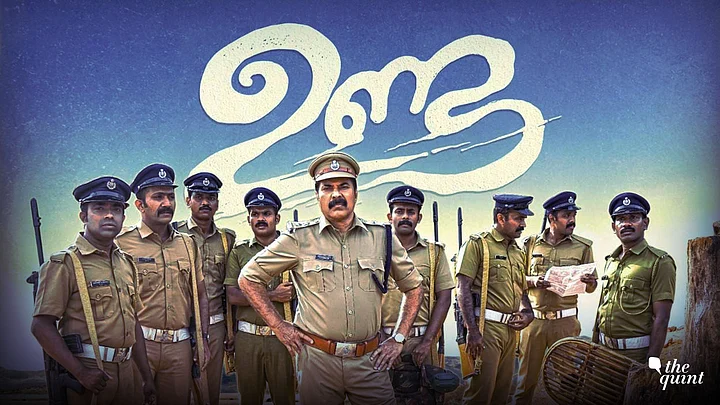Khalid Rahman’s second directorial venture Unda (Bullet) is about a bunch of unassuming policemen from Kerala who are packed off to Maoist-affected Bastar in Chhattisgarh for election duty. What unfolds is pandemonium – scary, funny and thought-provoking.
The theme is similar to that of Newton, but the outsider’s view is what lends this one a shot in the arm.
Headed by SI Mani (played by Mammootty), the group of nine young policemen learn the hard way that there is more to the country than the bubble called Kerala, where till date, no bullets had to be fired.
The Culture Shock
From the moment the cops land in Chhattisgarh, director Khalid Rahman makes it clear that Unda is not a movie written for the megastar Mammootty. Its aim is to try and document the differences between the North and the South – the politics, the culture and above all, the people.
The naïve, innocent officers from God’s Own Country are unable to grasp the horror of Maoism, just like they are wide-eyed when a few villagers complain that they have used up all the water. After all, these are phenomena you do not come across in a ‘heaven’ like Kerala.
With questions like “Do they exist?” to “What do Maoists want?”, Rahman holds up the ignorance of these officers for everyone to see.
Till the Maoists fire at their station one night, many of them don’t even believe the threat to be real. We cannot help but laugh when the ITBP officer asks the bunch to stop firing but they refuse to oblige, yelling ‘Maoists’, ‘Maoists’ in a frenzy. The film doesn’t get gory or violent, which is a pleasant surprise.
Regional Pride vs Nationalism
If Unda reveals the cultural/political shock of Malayali cops on one side, on the other it shows the stark contrast in their perception of patriotism. Unlike the ITBP officer from Haryana, Kapil Dev, who wears patriotism on his sleeve and talks about it often, Kerala cops talk about marriage, divorce, who’s dating whose sister, dreams of becoming a movie star, helping each other’s families, and so on.
Rahman emphasises the strong sense of regional nationalism that reigns above all. It is evident in a scene where one of them, while taking a dump in the open, says, “Our land is heaven when compared to this,” and another responds, “This is part of our land too.”
A Vulnerable Star
To top all this off, there is a shortage of bullets. Even SI Mani is struggling – with the language, lack of proper arms experience, and the onus of guiding these ‘kids’.
Mammootty’s stardom doesn’t lie in the machismo of his character. He navigates the unknown world of Bastar and never-seen-before threats with a lot of vulnerability.
Holding the group together, using his media contacts to get his government back home to notice their unpreparedness, building check posts on trees for better visibility— he is your average Malayali man who gets by using his wits. And so, you do not waste time in adulation. You root for him and his team. You want them to pull this off and survive.
And Unda doesn’t hold back in criticising the Kerala government too, which is not taking the request to send more bullets seriously. Many in the team have never fired a rifle that “probably hasn’t been used in Kerala since the British left”. But they take it in stride to uphold ‘Kerala pride’.
The Caste Angle
The issue of caste, too, is knit seamlessly into the storyline. With an Adivasi cop in the group who is always mocked by his teammates (one of them also equates him to the Maoists), the director shows that Kerala is not immune to the caste problem.
But the fact that in the face of terror, they unite without blinking an eye, makes us wonder if the state has perhaps more heart than its northern counterparts.
The threat is not just the Maoists or Naxalites, illustrates Unda, but also vile, entitled politicians and weak political systems. And when it comes to entitlement, Kerala police will not take it. They will resist... if not with bullets, then with the lathis they are so slick with.
When the credits roll, the super stars in the movie stay with you – the policemen who win us over with their goodness and wit, Kerala’s strong politics and unapologetic regional pride. Apart from that, Khalid Rahman’s Unda is a crash course for Bollywood on how to deconstruct a super star, strip him of his stardom, and utilise his expertise to the hilt.
(At The Quint, we question everything. Play an active role in shaping our journalism by becoming a member today.)



